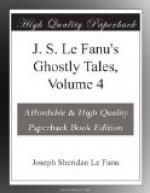“‘Oh, plase your honour,’ says my father (for he didn’t like to handle the sperit at all), ’I wouldn’t have the impitence to do the likes to your honour,’ says he; ’it’s only to poor crathurs like myself I’d do it to,’ says he.
“‘None iv your blarney,’ says the squire, ‘here’s my leg,’ says he, cockin’ it up to him, ‘pull it for the bare life,’ says he; ‘an’ if you don’t, by the immortial powers I’ll not lave a bone in your carcish I’ll not powdher,’ says he.
“‘When my father heerd that, he seen there was no use in purtendin’, so he tuck hould iv the leg, an’ he kept pullin’ an’ pullin’, till the sweat, God bless us, beginned to pour down his face.
“‘Pull, you divil’, says the squire.
“‘At your sarvice, your honour,’ says my father.
“‘Pull harder,’ says the squire.
“My father pulled like the divil.
“‘I’ll take a little sup,’ says the squire, rachin’ over his hand to the bottle, ‘to keep up my courage,’ says he, lettin’ an to be very wake in himself intirely. But, as cute as he was, he was out here, for he tuck the wrong one. ‘Here’s to your good health, Terence,’ says he, ‘an’ now pull like the very divil,’ ‘an’ with that he lifted the bottle of holy wather, but it was hardly to his mouth, whin he let a screech out, you’d think the room id fairly split with it, an’ made one chuck that sent the leg clane aff his body in my father’s hands; down wint the squire over the table, an’ bang wint my father half way across the room on his back, upon the flure. Whin he kem to himself the cheerful mornin’ sun was shinin’ through the windy shutthers, an’ he was lying flat an his back, with the leg iv one of the great ould chairs pulled clane out iv the socket an’ tight in his hand, pintin’ up to the ceilin’, an’ ould Larry fast asleep, an’ snorin’ as loud as ever. My father wint that mornin’ to Father Murphy, an’ from that to the day of his death, he never neglected confission nor mass, an’ what he tould was betther believed that he spake av it but seldom. An’, as for the squire, that is the sperit, whether it was that he did not like his liquor, or by rason iv the loss iv his leg, he was never known to walk again.”
* * * * *
THE MYSTERIOUS LODGER
PART I
About the year 1822 I resided in a comfortable and roomy old house, the exact locality of which I need not particularise, further than to say that it was not very far from Old Brompton, in the immediate neighbourhood, or rather continuity (as even my Connemara readers perfectly well know), of the renowned city of London.




